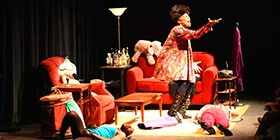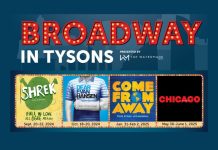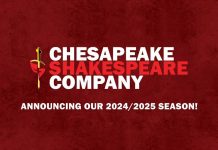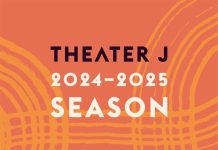The Rainbow Theatre Project, Metro DC’s very own LGBTQ theatre company, has just begun its second season. If that sounds intriguing but you’ve never heard of it, small wonder. As H. Lee Gable, Artistic Director, told me when we talked recently, “It’s kind of like we’re taking the stealth approach, letting word-of-mouth develop as people come in and see us.”
I’ve now seen two Rainbow Theatre Project productions—both of which I just happened to hear about—a musical, Yank!, and a double bill of one acts, The Betty & Veronica Plays and My Night With Rock Hudson. Each was one night only, and each was presented as “a concert reading,” a term new to me.
Connecting the dots of the two evenings, it occurred to me that Rainbow Theatre Project is doing something very original, very focused, very skilled, and very rewarding. But since there are never any opening nights or reviews, no one could possibly know what Rainbow Theatre Project does until they get there. So I thought a brief introduction might be in order.

John: Who formed the Rainbow Theatre Project and why?
Lee: The idea came about three years ago. Michael Kelley, now our managing director, and I had known each other for almost 25 years, and we both found ourselves working at Kennedy Center. He overheard me talk about a trip I’d taken to New York where I’d seen The Normal Heart, and he then told me he’d always had a dream that there should be a theatre for the gay and lesbian community in Washington, DC. Six days later I said let’s have lunch, and I presented him with a six-page proposal for a theatre company based on his idea. He looked at it, got a big smile on his face, and said, “I think we’re on the same page.”
Michael felt very strongly that we should have a theatre dedicated to our community and telling our stories—and not just what I call the top 20 stories. There are great plays being done by everybody else—Torch Song Trilogy at Studio Theatre, The Normal Heart at Arena Stage. But there are all these other plays out there that aren’t getting done. And these are plays of their time.

We took about two years planning, getting our website up, doing research. Rather than do a full production of one play, I said let’s do concert readings of five pieces.
Many people have an idea of what a staged reading means. They may have gone to Page-to-Stage at Kennedy Center, and there are a lot of theatres around town doing one-night-only staged readings. But the term “concert reading” may not register. From what I’ve seen, I now know it means scripts in hand, plus a whole lot more—costume elements, props, music, blocking, and with the Rock Hudson you even had projections—all of which is way beyond a staged reading. Did you make the term up?
No, the Encores! up in New York use the term for their stagings of musicals—like what we did with Yank! I get bored if I see actors standing at music stands reading scripts, though I have heard some really wonderful plays that way. I wanted to take it a little further, create more of the environment the play would be living in, with some pieces of set, suggestions of lights and sound, actors making entrances and exits. I used the expression “concert reading” so people would ask, What’s that?
How does an audience know what your season-planning taste is, and how do they know it’s a theatre for them, as opposed to just a show for them one at a time? Some of the best theatres in town have a very clear and strong curation identity, and I think yours is emerging. It’s going to take a season or two for people to catch on. In the DC landscape there are several other LGBT-themed performing arts entities. There’s Reel Affirmations, there’s the DC Queer Theatre Festival, there’s Alan Sharpe’s African American Collective Theatre. How do you see Rainbow Theatre Project in relation to such other organizations?
One of the first things we did was the name, Rainbow Theatre Project. We wanted there to be no doubt about who we were. And one of the reasons we did concert readings the first season was so that people could get to know us. We didn’t charge that first season; it was free. Michael’s job was to get them in the door, and my job was to make sure they saw something they weren’t expecting. We tend to go lighter right now, because I want people to depend on us for quality work as well as knowing they’re going to be entertained and hear a story that would touch them. We ended the season with a musical, Yank! That was a big success. Our audience development continues November 21st and 22nd with a play produced by Brave Soul Collective about two African American drag queens called WTF Happened to Baby’s Sister? We’re presenting it, but it was produced by Brave Soul Collective.
Are you thinking about partnerships/collaborations with other companies in town?
We’re totally open to it. We want to be the premiere theatre of the LGBTQ community, but we’re not the only theatre for our community.
I’ve seen two of your concert readings—Yank!, which exceeded my notion of what a “reading” would be. It had music and it was as close to staged as it could get without costumes and a set. And it was really interesting how the theme of romance in the military resonated. That piece was written while ‘Don’t Ask Don’t Tell’ was still in place, and there it was being performed after the end of ‘Don’t Ask Don’t Tell.’ And I had a similar response when I saw The Betty & Veronica Plays and My Night With Rock Hudson. On the face of it they’re very different, but what they both had in common was an older playwright looking back at youth, at a formative experience—in the case of Betty & Veronica it was a lesbian’s early life; and in the case of My Night With Rock Hudson, a gay man’s early life. Was that conscious to pair those two, to have a generational theme?
Yes, because they were memory plays. You get to see somebody today and see where they came from or what they’re looking back on.
Tell me about your next concert reading.
On November 17th we’re presenting a full length brand-new play by Jeffrey Higgens called I’m Just Saying and a short piece by Roberto Aguirre-Sacasa called Swamp Gothic. I call those two plays millennial plays because the characters are all in their twenties. There’s an interesting generation gap in the gay community. Things that I might find offensive a twentysomething will look at me and say, Well you need to get over that. And I realized this when I was reading I’m Just Saying. I wanted to slap the gay character! And then I realized he’s coming from a different mindset. He came out when he was young and his best friend, who’s straight, has known he was gay forever. That’s a whole different experience from what I grew up with back in the 60s and 70s. I offered the play to two directors who are about my age, and both of them came back to me and said, No, I don’t like this, I don’t like this at all. Then I gave it to a young director who is 26 and he said, Oh, I totally get this. That’s what our series Generation Q is about: New voices, new stories coming from our playwrights.
When Rainbow Theatre Project started, we didn’t run out and try to get everybody to come in and review our plays, we didn’t hammer on doors, we didn’t even send out a press release about our first show until a week before. People will come look at what we do, see what’s next, and they’ll come back and they’ll tell others and keep checking our Facebook page or Twitter (@rainbowtheatrep). Part of it is just continue to keep working, keep doing the work, because eventually someone’s going to say, You know this Rainbow Theatre Project I keep hearing about? What are they doing? And they’ll get curious and they’ll show up.
I’m Just Saying and Swamp Gothic will be presented November 17, 2014 at Source – 1835 14th Street, NW in Washington, D.C. Tickets are available online.
WTF Happened to Baby Sister? will be presented November 21 and 22, 2014 at Source – 1835 14th Street, NW in Washington, D.C. Tickets are available online.








